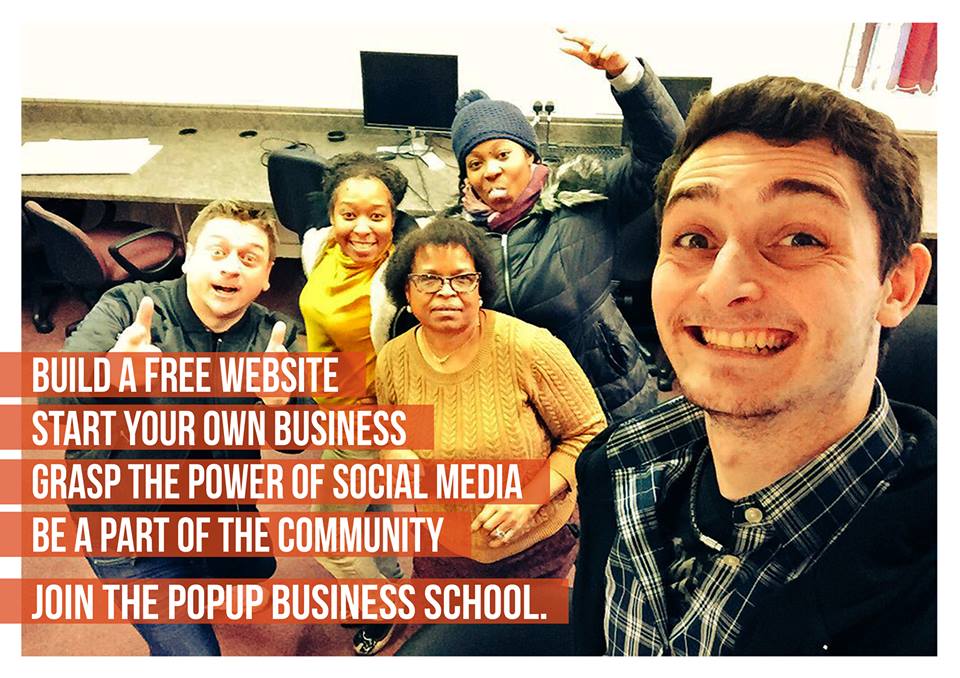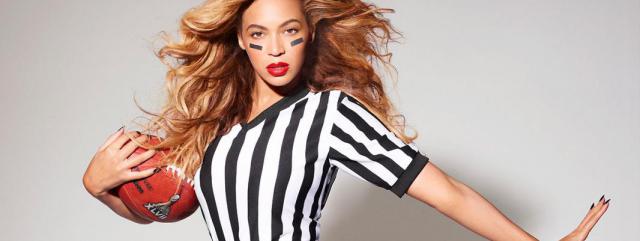|
I've been a little quiet on the blog here and on social media in general the last few weeks, which is mainly because I've been busy managing and posting on the accounts of my clients. I've recently picked up a large piece of work with my old friends at The PopUp Business School who are currently putting together one of their biggest events to date. I love working with these guys because their passion and enthusiasm for what they do is just so infectious that I can't help leaving any meeting with them with a massive smile on my face. Their whole ethos is 'Make Money - Do Good - Have Fun' which from what I've seen is the best way to be in business.
They specialise in helping people start businesses from nothing, without spending any money, inspiring them to turn what they love doing into an income. I first met them when they invited me to deliver a series of talks at one of their events in Birmingham in 2013, before I'd really thought of turning my passion for social media into a full-time business. It's safe to say that I learned more about starting a business in a fresh new way in my 4 days with them than I'd ever considered possible. I simply wouldn't be in business today if I hadn't met them when I did. They've also been a continual source of support and inspiration ever since. So when they got in touch with me about helping with their social media campaigns and their next big event, I literally jumped at the chance to work with them again. And their next big event, which we're calling #PopUpReading certainly is big! They've partnered with West Berkshire Council, Jobcentre Plus, Reading UK CIC, Hammerson and The Oracle shopping centre in Reading, to run a two-week long event from 29th February 2016, helping local people to start their own businesses. Tickets to this amazing opportunity are completely free for everyone and The Oracle have also donated one of their stores in the heart of the shopping centre as the venue. So not only will people be able to attend a whole two week programme of business workshops, but they'll also be able to sell their products and services directly from the store. It's an amazing opportunity for budding entrepreneurs or anyone that's considered becoming self-employed but don't know where to start. I'll be there delivering a talk on 4th March 2016 about the lessons I've learned with my own business, as well as offering advice on how to leverage social media for your business. I'll also be there live-tweeting, streaming video, capturing content for their ongoing campaigns and generally supporting all the attendees and speakers, so feel free to drop by for a chat! The full workshop schedule and registration for FREE tickets to the event are available here and you can keep up to date with the team, the event and engage with us through social media on the channels below. Hope to see you at #PopUpReading!
2 Comments
There can be no doubt that last weekend's Super Bowl 50 is big business. Massive celebrity endorsement across social media, the national anthem sung by Lady Ga Ga and millions tuning in to watch the event and it's half-time show featuring Coldplay, Bruno Mars, Mark Ronson and Beyoncé. 30 second television adverts alone sold for $5 million through CBS, which equates to around $166, 666.00 per second!
What struck me whilst watching, was the overwhelming prevalence of hashtags on all the adverts, particularly the movie trailers. Hashtags were in 45 percent of Super Bowl 50 ads, slightly down from 50 percent last year. Twitter and Facebook tied as the most-mentioned social networks, though neither was explicitly mentioned often. For hashtags, 45 percent is the lowest percentage in Super Bowl ads since MarketingLand.com has been tracking their usage over the last four years. In 2014, hashtag usage in Super Bowl ads hit a peak of 57 percent. It was 50 percent for 2013 and 2015. The lowest usage was in 2012. Perhaps unsurprisingly, the ads were dominated by the massive global brands, soft drinks, snacks, car manufacturers and of course 2016's upcoming movie trailers. You may remember our post from a few weeks back, about how the movie 10 Cloverfield Lane had snuck it's way onto social media with little introduction, in such covert fashion that when it hit, audiences went wild on social channels about it. Well, it was in there again at the Super Bowl using it's same quietly unassuming hashtag of #Cloverfield, but some went seriously over the top with theirs, all of which led to most of them trending over the course of the weekend and into this morning. Here's our top ten movies and #hashtags from the Super Bowl : 10. 10 Cloverfield Lane - #Cloverfield We've already mentioned this one a few times, but they're sticking with the classic #Cloverfield, no doubt to tie it in with the previous movie and connect with an already established audience for their almost home-movie/monster/invasion genre. 9. Deadpool - #Deadpool The Ryan Reynolds fronted and produced movie for one of the Marvel Universe's most anti of heroes, stuck with it's namesake, no-frills hashtag as it begins to hit cinemas this week. With all the promo work they've put in up-front, it's been trending for several weeks already. It looks like a sure-fire hit for Valentine's weekend. 8. Gods of Egypt - #GodsofEgypt I would have expected the all-star cast and massive scale of this production to have this hashtag trending already as the movie studio's colossal media engine has been in overdrive in recent weeks. It was trending this weekend, but unfortunately for all the wrong reasons as it's being held up by social media audiences of another example to be added to the 'all-white oscars' boycott as very few of the actors used in the promotional material are of an ethnic background for a movie based in the middle-east. 7. Jason Bourne - #JasonBourne #BourneBetrayal The return of Matt Damon to the Bourne franchise was met with the loudest cheer of the night in my household, louder than any of the plays on the field. In no small part I think the return of the original and best Bourne (sorry Jeremy Renner!) and the no-nonsense approach to the trailer, re-awakened fans of the films and it's hashtags are still trending now. 6. Independence Day : Resurgence - #IndependenceDayMovie #IDR It's a long title to try and cram into a concise hashtag, so they've gone from one extreme to the other with the sequel to the 1996 blockbuster with one hashtag that uses the whole movie title and another that just abbreviates it's initials. Interesting choice considering the original movie had the rather unique #ID4 to coincide with it's 4th of July release date. No such genius at work here though, unfortunately. 5. Disney's The Jungle Book - #JungleBookTrailer Clearly fans of telling it like it is, Disney opted for a pretty self-explanatory hashtag for their trailer of the live-action version of The Jungle Book. Again, devoid of any particular imagination and by opting to specify this is for the 'trailer' may cause problems for longevity when the movie actually comes out further down the line. 4. Eddie The Eagle - #EddieTheEagle Another nice and simple use of the hashtag here, which is easily recognisable to a British audience. I'm not too sure whether a US or global audience is quite as familiar with the ski-jumper's story as we are though. 3. X-Men Apocalypse - #XMenApocalypse #XMEN The trend of jamming a whole movie title continues with X-Men Apocalypse (let's hope they don't do the same for Pride and Prejudice and Zombies!) as the franchise and it's familiar cast return to the big screen. 2. Teenage Mutant Ninja Turtles 2 - #TMNT2 #NinjaTurtles2 #TMNTMovie #Krang Some nice and concise abbreviation here to make sure that the mouthful of a movie title fits nicely in a few hashtags here. I particularly like the use of #Krang as a little insight into what to expect from the film itself, other than Arrow's Steven Amell of course! 1. Captain America : Civil War - #CivilWar #TeamCap #TeamIronMan This movie title had the potential to create an incredibly long hashtag that no-one could hope to possibly squeeze into a tweet. Instead, the Marvel cinematic universe has decided to focus on the film's plot of essentially Captain America vs Iron Man and getting the audience to decide who's side they're on, which is a great engagement tactic. They're also asking their audience to speculate as to which of the other 'supers' will be taking which side. Whilst it's an excellent participation device, it's also led to the creation of a whole further raft of hashtags like #WarMachine #Hulk #Thor #BlackWidow #AntMan #BlackPanther #ScarletWitch (you get the idea!) as they all feature in the movie! It's clear that the bigger the franchise, the bigger the hashtag or number of hastags in use. But is hashtag use in decline as the figures from the Super Bowl suggest? Or do our audiences simply expect a higher quality of hashtags that better relate to the material? As ever, I'd love to hear your thoughts. Yours Socially M In a recently published blog post, Facebook has alluded to further changes in their news feed algorithm. That magical formula that all social media and digital marketing experts spend their lives trying to discover and exploit. There have already been many changes to the way that Facebook decides what you get to see on your own feed since it's inception, so what can we expect from these new changes? Well, it seems that Facebook's new approach is all about relevance and balance. They want to build a news feed full of stories and content that you actually want to read. They want to populate users' news feeds with content that both spurs engagement and leaves the audience satisfied with it's quality. The company announced on Monday that they're focusing heavily on human assessment of what constitutes decent and relevant content, instead of simply using the old vanity metrics of likes and comments on a post to prove it's popularity. What you may not know is that this system has been around since early 2014 when Facebook created a group of 1,000 users who voluntarily rate the quality of posts that appear in their news feeds. Early analysis of the results from this group have shown that there are many posts that users are interested in, but wouldn't necessarily click 'like' on. For example, it's only human to be interested in a post which laments the loss of a loved one, or details a specific misfortune. You'd want to be kept up to date with such developments amongst your close friends, you may even want to comment and offer your sympathies, but it may not be appropriate to actually 'like' the post. On the flipside there are plenty of posts that you'll have seen in your news feed which have hundreds and thousands of likes and comments, but actually have little interest to you personally. No doubt you've seen plenty of spurious posts that attract plenty of engagement but have very little quality or end up frustratingly being about nothing like the headline suggested before you clicked through. Pictures of cats, videos of toddlers falling over and clickbait articles to lads magazine type websites instantly spring to our minds. "News Feed will begin to look at both the probability that you would want to see the story at the top of your feed and the probability that you will like, comment on, click or share a story. We will rank stories higher in feed which we think people might take action on, and which people might want to see near the top of their News Feed." So what does this mean for business? Well, page-owners who use clickbait or content completely un-related to their brand or business in the hope of encouraging more likes and comments will see their traffic decrease significantly. Facebook has also made it very clear that pages that attempt to artificially engineer likes and comments through stories that their audience wouldn't ordinarily want to read will also suffer with their reach and who gets to see this kind of content. Likewise, it is possible that the ability to 'boost' or 'promote' such posts through paid channels will also be removed at Facebook's discretion.
Essentially, Facebook is trying to become more human and more sociable. It's trying to understand what users like and what they don't, to show them more of the former and less of the latter. Business pages that consistently post relevant, quality and engaging content will continue to be rewarded for being themselves and being true to their audiences. Some experts have predicted that this will see an end to virality, but we don't think that's the case at all. What it does mean though, is that your content needs to meet a certain level of quality before even being considered to reach a wider audience and the potential to go viral as a result. But shouldn't we all be focused on creating quality content over quantity and cheap gimmicks anyway? As ever, we'd love to hear your thoughts. Yours Socially M |
Archives
October 2023
|




 RSS Feed
RSS Feed
